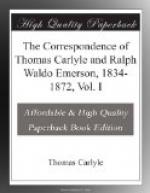lecture upon these topics written for England may
be read to America. Evermore thanks for the
brave stand you have made for Spiritualism in these
writings. But has literature any parallel to
the oddity of the vehicle chosen to convey this treasure?
I delight in the contents; the form, which my defective
apprehension for a joke makes me not appreciate, I
leave to your merry discretion. And yet did ever
wise and philanthropic author use so defying a diction?
As if society were not sufficiently shy of truth
without providing it beforehand with an objection
to the form. Can it be that this humor proceeds
from a despair of finding a contemporary audience,
and so the Prophet feels at liberty to utter his message
in droll sounds. Did you not tell me, Mr. Thomas
Carlyle, sitting upon one of your broad hills, that
it was Jesus Christ built Dunscore Kirk yonder?
If you love such sequences, then admit, as you will,
that no poet is sent into the world before his time;
that all the departed thinkers and actors have paved
your way; that (at least when you surrender yourself)
nations and ages do guide your pen, yes, and common
goose-quills as well as your diamond graver.
Believe then that harp and ear are formed by one
revolution of the wheel; that men are waiting to hear
your epical song; and so be pleased to skip those
excursive involved glees, and give us the simple air,
without the volley of variations. At least in
some of your prefaces you should give us the theory
of your rhetoric. I comprehend not why you should
lavish in that spendthrift style of yours celestial
truths. Bacon and Plato have something too solid
to say than that they can afford to be humorists.
You are dispensing that which is rarest, namely,
the simplest truths,—truths which lie next
to consciousness, and which only the Platos and Goethes
perceive. I look for the hour with impatience
when the vehicle will be worthy of the spirit,—when
the word will be as simple, and so as resistless,
as the thought,—and, in short, when your
words will be one with things. I have no hope
that you will find suddenly a large audience.
Says not the sarcasm, “Truth hath the plague
in his house”? Yet all men are potentially
(as Mr. Coleridge would say) your audience, and if
you will not in very Mephistophelism repel and defy
them, shall be actually;* and whatever the great or
the small may say about the charm of diabolism, a
true and majestic genius can afford to despise it.
------------ * This year, 1882, seventy thousand copies of a sixpenny edition of Sartor Resartus have been sold. -------------
I venture to amuse you with this homiletic criticism because it is the sense of uncritical truth seekers, to whom you are no more than Hecuba, whose instincts assure them that there is Wisdom in this grotesque Teutonic apocalyptic strain of yours, but that ’t is hence hindered in its effect. And though with all my heart I would stand well with my Poet, yet if I offend I shall quietly retreat into my Universal relations, wherefrom I affectionately espy you as a man, myself as another.




